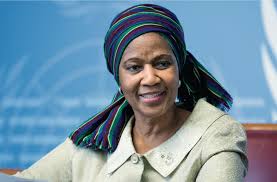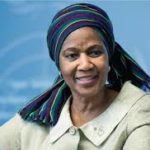By Haruna Gimba
As the world celebrates the 2018 International Day of the Girl Child, the Executive Director of the UN Women, Phumzile Mlambo-Ngcuka, has urged girls and women to be courageous.
In a letter address to the girls to commemorate the day, Phumzile Mlambo-Ngcuka said it is a critical time for the girls in the world and a time for the protection and assertion of rights.
She said it is a time to listen hard and speak louder, no matter how difficult; to call out the continuing imbalances of power; to band together and take a stand on the changes that must happen so that girls and women are heard and their experiences are taken seriously. “It is a time to act, together with men and boys, on the issues that will determine a lived equality for all, central to which is the ending of violence against women and girls.
“We see over and over again how hard it is as an individual to raise your voice in defense of rights and how easily authority figures can discount, trivialize or silence it. It should not be difficult to complain about the violation of rights, but it is, especially in situations where shame has become normalized, as is often the case for example with the experience of sexual violence,” she was quoted as saying.
Phumzile Mlambo-Ngcuka also added that globally, less than 40 per cent of women who experience sexual harassment and assault seek help of any sort, with only 4 per cent seeking help from the police. She said: “We are working to shift the burden of shame to those who commit the abuse, and to stop the stigmatization and silencing of the survivor. Survivors must be at the centre of any response; and their experiences must be listened to and acted on to end the culture of impunity.
We urge all institutions, public and private, to do the same, whether a school, a place of worship, a sports club, a transport company or any employer or political leader. According to the letter, during the 73rd UN General Assembly, UN Women presented a report on the intensification of efforts to eliminate all forms of violence against women and girls.
“That report made it clear that such acts of violence are a systemic violation of human rights in all settings, including online. It urged all global leaders and organizations to take specific actions to address issues like the unequal power relations between men and women, the social norms that condone and perpetuate violence, the strengthening of laws and judicial processes, and the provision of victim support.
“Solidarity matters. We have seen the power of solidarity to resist and counter silence. National and international movements against violence and sexual harassment like ‘#MeToo,’ ‘#TimesUp,’ ‘#BalanceTonPorc,’ ‘#NiUnaMenos and UN Women’s #HearMeToo, have brought momentum and visibility to public calls for an end to impunity. This solidarity must continue so that we can end the impunity not only of individuals but also of institutions.”
Phumzile Mlambo-Ngcuka emphasized that ending violence against women and girls is at the heart of the UN Women work and a central part of fighting for gender equality.
“On this Day, we stand with girls everywhere as they inspire, innovate and take charge of their own future. We celebrate the strength and the potential of the 1.1 billion girls in today’s world who are challenging the status quo, raising their voices against violence, and innovating technology to solve global challenges, standing up for the environment, and preparing to lead.”





